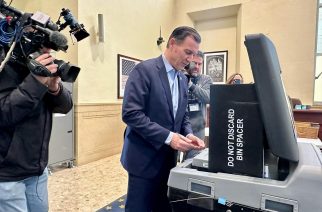
Barbara Underwood is currently the acting Attorney General. She served as solicitor general under former Attorney General Eric Schneiderman and assumed his position following his resignation earlier this month.
Interviews for the interim attorney general position officially concluded Wednesday around noon.
Questions regarding topics such as workplace harassment, opioids, New York relations with the federal government, political party tribalism, civil rights and the status of American democracy dominated each interview. In addition to these topics, each candidate had uttered one name at least once during each procession — Barbara Underwood, the acting attorney general.
Underwood’s interview kicked off the search for a qualified interim attorney general yesterday at 2 p.m., which consequently set the bar for the rest of the candidates. Underwood disclosed to the legislators and public that even if she were to be selected, she would not seek reelection in November, but would be “honored to serve as solicitor general if the elected attorney general” asked her to do so.
As pointed out by Sen. Brad Hoylman, multiple candidates had brought up — to at least some effect — Underwood’s qualifications for the position.
“I would like to benefit from learning from Underwood’s brilliant legal mind — far superior to my own and all of the candidates,” said candidate Michael Diederich Jr. in his opening statement.
However, Diederich said that Underwood should not be seated as attorney general because “she is so skilled at advocating for the state” and becoming attorney general would cause her to “lose her availability to fully advocate for the state by taking her away from the solicitor general position.”
Following Diederich’s numerous mentions of Underwood’s qualifications, legislators began to add to their list of questions for subsequent candidates what they thought of Underwood for the position.
The rest of the candidates for the day, Nicole Geureon, Thomas E. Humbach, Jennifer P. Stergion and Alex Zapesochny seemed to echo Diederich’s statement in that they admire and respect Underwood, but believe they would be a better fit for the position.

The selection committee, comprised of state legislators, focused their questions around tribalism, civil rights and acting Attorney General Barbara Underwood.
Candidate Nicole Gueron specifically suggested that the legislators consider other candidates because Underwood is a “self-proclaimed short-termer, which may undermine the office.”
Gueron’s comment became a point of interest, as Underwood’s decision to not run in November seemed to be received by legislators as a positive attribute. Underwood said a temporary appointment would allow her to focus on her work as attorney general and remove the distraction of campaigning.
However, Gueron painted Underwood’s decision in a negative light, saying that as a “short-termer” Underwood may not be fully invested in the position as interim attorney general.
New York Public Interest Research Group Executive Director Blair Horner said there is no evidence that Underwood would not take the position seriously, even though it is a temporary position.
“There’s nothing in Underwood’s background that would lead one to believe she would ever take her foot off the gas,” Horner said.
Regarding the ambiguous positive or negative nature of an interim attorney general who will be seeking reelection, Horner said the Democrats may favor someone who is not seeking reelection so they can avoid fierce divisiveness within the party when it comes time to nominate a candidate for the general election.
From the legislative perspective, the appointment process has been complicated given circumstances that former Attorney General Eric Schneiderman resigned weeks prior to the Democratic Convention and the number of people who have expressed interest in the full-term position.
Horner said an interim attorney general who was appointed by the Legislature would appear to have a leg up on the competition for winning the Democratic nomination, as the power of incumbency during an election in New York is historically invaluable.
“The idea that one of the [applicants] would not be running for the post makes issues with the internal politics of the Democratic Party a bit easier,” Horner said.
Horner said that if Democratic candidates for Attorney General have allies who could act to benefit the Democratic party, if those allies are upset by the party’s decision to nominate the incumbent, the loss of potential quid-pro-quos from the allies would, in turn, exacerbate tensions within the party.
However, during the interviews, legislators who expressed favor with Underwood’s decision to not seek reelection simply credited their feeling to the fact that an interim attorney general such as Underwood would not be distracted by actively campaigning for the November election.
The Legislature has not yet announced a time frame for when they will make the appointment for interim attorney general.









